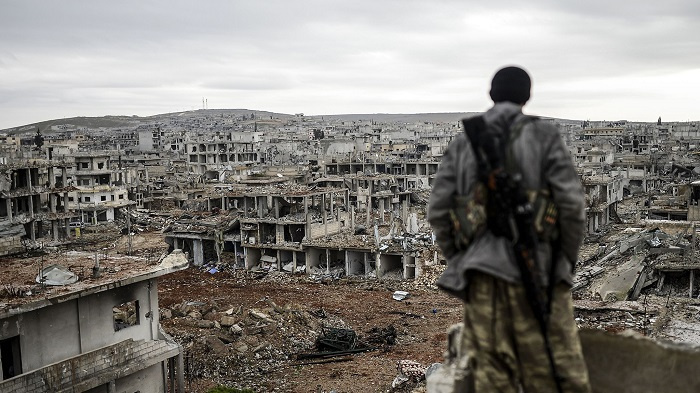Has the Syrian War Come to Its End?

When Russian sources reported on the possibility of the death of Ibrahim Awwad Ibrahim Ali al-Badri al-Samarrai, aka Abu Bakr al-Baghdadi, the founder of ISIS caliphate, I wondered why the term ‘possibility’. Naturally, the news could raise the interest of any keen observer of the Middle East developments, through not in terms of its (non-) credibility, which I am certain is negative, since Ibrahim Awwad’s tribe have not confirmed the news of his death.
News appeal lies elsewhere. For every commentator who has studied the history of Iraq and the Levant and is familiar with the region in its human, geographical and political aspects, the ongoings in the region are inevitable consequences of its geography and history.
As the common saying goes, “history repeats itself”. It is true that similar causes can create similar effects, which the public view as repetition; however, when we take another key factor, i.e. time, into consideration besides the mix of history and geography, the emergence of incidents with similar causes and similar outcomes does not signify repetition, since every event is particular to its time of occurrence, despite the similarities.
In the light of this introduction and through a comparative historical lens, the reports of the Daesh so-called Caliph’s death find a new significance. Let us take a look back at the chain of events that led to the fall of Hitler’s empire, the Third Reich, in Germany. Berlin was occupied by the Allies, i.e. American and Soviet forces. Today, the circumstances in Raqqa and Deir ez-Zor are very much comparable. The two main forces, Americans and Russians, have met behind the walls of these two cities. Both powers possess the same kind of intrinsic character history has told us about: prudent and calculating nevertheless supremacist and totalitarian in the face of the rival.
Looking at both the history and geography of the region, once can safely assume that geopolitical unit will take a route similar to that it took during the advancement of British and French forces in the German soil during the Second World War. From such a vantage point, the rumor about al-Baghdadi’s death will have a function similar to Second World War rumors: to stop the advancement and buy time in order to prevent any imminent clash between the two sides.
The summation of news updates and reactions over the past 20 days indicated a looming heads-on between the two major forces and their allies, a new crisis that could further complicate the situation. The assumption found proof in the logic of material developments on the ground, too. Thus, it seemed that a solution was needed to prevent such a clash, even if a new agreement had to be written in the vein of the Sykes–Picot Agreement. A Lavrov-Tillerson agreement, if you would like.
The aggravating domestic situation in the United States, i.e. Trump’s involvement in the Russia probe, Russia sanctions, Putin’s threats about the consequences of the sanctions, and Russia’s offering of asylum to ex-FBI director James Comey, similar as the one granted to Edward Snowden, are other signs that confirm this claim.
Additional signs also abound: Erdogan calling for involvement of Saudi Arabia and the US in the trilateral Astana talks or Staffan de Mistura, United Nations special envoy for the Syria crisis, abruptly announcing a forthcoming summit after months of blackout.
From this viewpoint, the abrupt and harsh position shift in Saudi Arabia against Qatar could be seen as pressure to persuade Doha, as a key supporter of insurgents, to put an end to its Syria policy and succumb to whatever the negotiations will determine. In this formulation of the developments, Qatar was a major player that could be, relying on Turkish protection and cooperation, through a wrench in negotiations.
Clearly, if the ultimate agreement is reached, ground troops will either be sacrificed or undergo radical transformations to align themselves with key players of the Syria war. In that case, Qatar can also return to the Gulf Cooperation Council and each side takes its spoils.
For observers, the war of words between Putin and the US is more indicative of a diplomatic exchange of fire than of hostility. But to what end? There are only two possibilities: either the agreement between Washington and Moscow is in its final stage and each side is trying to control their allied partisan groups; or that White House and Kremlin are on the threshold of serious negotiations to reach an agreement, trying to create as strong leverage as possible, to have the upper hand in the “Great Deal”.
To sum it up: the battle on the ground seems ended. The present contact lines between forces of each side could be the benchmark for new borders, unless another development happens behind one of the fronts.

